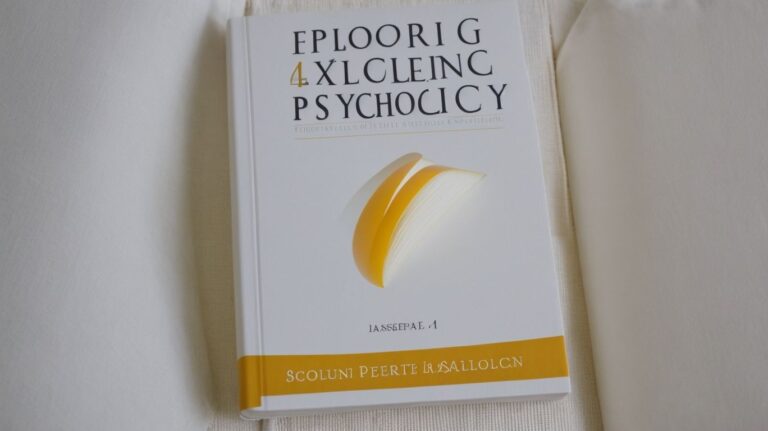Martin Seligman, a renowned psychologist, has made significant contributions to the field of psychology, particularly through his work in Positive Psychology. This article explores who Martin Seligman is, the key concepts of Positive Psychology, and how it differs from traditional psychology.
We also delve into Seligman’s research on learned helplessness and its implications, as well as the lasting impact of his work on the field of psychology, including the shift towards positive psychology, applications in therapy and education, and influence on research and well-being.
Contents
- 1 Who is Martin Seligman?
- 2 What is Positive Psychology?
- 3 What are the Key Concepts of Positive Psychology?
- 4 What is Learned Helplessness and How Did Seligman Contribute to its Understanding?
- 5 How Has Seligman’s Work Influenced the Field of Psychology?
- 6 Frequently Asked Questions
- 6.1 What is Martin Seligman’s impact on the field of psychology?
- 6.2 What are some of Martin Seligman’s major contributions to the field of psychology?
- 6.3 How did Martin Seligman’s work influence the development of positive psychology?
- 6.4 What impact has Martin Seligman had on the treatment of mental health?
- 6.5 How has Martin Seligman’s work influenced the education system?
- 6.6 What legacy has Martin Seligman left on the field of psychology?
Who is Martin Seligman?
Martin Seligman, a prominent figure in the field of psychology, is renowned for his contributions to Positive Psychology.
As the Director of the Positive Psychology Center at the University of Pennsylvania, Seligman has played a pivotal role in advancing the understanding and application of positive psychology principles. His research has delved into areas such as optimism, resilience, and happiness, shedding light on how individuals can cultivate a fulfilling and purposeful life.
Seligman’s influence extends beyond academia, with his work impacting fields such as education, healthcare, and business, emphasizing the importance of well-being and flourishing. His teachings have inspired countless individuals to adopt a more positive outlook and enhance their overall quality of life.
What is Positive Psychology?
Positive Psychology, a branch of psychology pioneered by Martin Seligman and others like Kendra Cherry, focuses on promoting well-being and happiness.
One of the core principles of Positive Psychology is its emphasis on character strengths, recognizing the importance of cultivating virtues such as courage, wisdom, kindness, and resilience. This approach moves away from traditional psychology’s focus on pathology and instead highlights what makes life worth living.
In addition, Positive Psychology introduced the PERMA Model, which stands for Positive Emotions, Engagement, Relationships, Meaning, and Accomplishment. This framework provides a roadmap for individuals to enhance their overall well-being and lead a more fulfilling life.
How is Positive Psychology Different from Traditional Psychology?
Positive Psychology diverges from traditional psychology by emphasizing the cultivation of positive emotions, character strengths, and a meaningful life, in contrast to the DSM’s focus on mental disorders and pathology.
Positive Psychology aims to highlight the potential for growth and fulfillment in individuals, shifting the focus from mere problem-solving to enhancing overall well-being and personal development.
Unlike traditional psychology, which often delves into analyzing dysfunctional behaviors and disorders, Positive Psychology directs attention towards exploring human strengths, resilience, and the pursuit of happiness.
It encourages individuals to tap into their intrinsic motivations, fostering optimism, gratitude, and a sense of purpose in life.
What are the Key Concepts of Positive Psychology?
The core tenets of Positive Psychology, as outlined by Christopher Peterson and others, revolve around the CSV framework, emphasizing positive emotion, Character Strengths, and the pursuit of a fulfilling life through the Pleasant, Good, and Meaningful Life.
Positive Psychology, with its emphasis on well-being and happiness, has gained significant attention in the field of psychology. One of the key frameworks that underpin Positive Psychology is the renowned PERMA Model developed by Martin Seligman. The PERMA Model highlights five essential elements crucial for a flourishing life:
- Positive Emotion
- Engagement
- Relationships
- Meaning
- Accomplishment
Understanding and cultivating these aspects can lead to increased life satisfaction and overall well-being.
Focus on Strengths, not Weaknesses
Positive Psychology advocates for a focus on individuals’ strengths rather than weaknesses, nurturing positive attributes and capabilities for personal growth and well-being.
By emphasizing strengths in Positive Psychology, individuals are encouraged to explore their unique talents and virtues, fostering a sense of give the power toment and self-worth. This approach stands in contrast to traditional deficit-focused models that often center around fixing what is wrong rather than enhancing what is right.
Through the lens of Positive Psychology, individuals can cultivate resilience, optimism, and a growth mindset, which are essential components for personal growth and overall well-being. By focusing on what is going well and amplifying positive aspects of one’s life, individuals can experience increased satisfaction, happiness, and fulfillment.
Cultivate Positive Emotions
Cultivating positive emotions is a fundamental aspect of Positive Psychology, promoting well-being and resilience through practices that enhance happiness and contentment.
One effective strategy to foster positive emotions is practicing gratitude. Regularly acknowledging blessings and expressing thankfulness can shift focus from negatives to positives, boosting overall mood.
Mindfulness meditation, another technique in Positive Psychology, encourages living in the present moment and accepting thoughts without judgment, leading to reduced stress and increased emotional well-being.
Incorporating acts of kindness into daily routines can also create a ripple effect of positivity, benefiting not only others but also enhancing one’s sense of purpose and satisfaction in life.
Foster Meaning and Purpose
Fostering a sense of meaning and purpose in life is central to Positive Psychology, encouraging individuals to engage in activities that align with their values and contribute to a greater sense of fulfillment.
When individuals have a clear sense of purpose, they are more likely to experience higher levels of satisfaction in various aspects of their lives. This clarity provides a guiding light towards making decisions that resonate with their core beliefs and aspirations.
By connecting daily actions to deeper meanings, individuals can infuse their lives with a sense of meaning that goes beyond mere achievement. This internal compass helps them navigate challenges with resilience and optimism, leading to improved mental well-being.
Build Positive Relationships
Building positive relationships and fostering social connections are key pillars of Positive Psychology, as they play a vital role in promoting happiness, well-being, and emotional support.
Research in the field of Positive Psychology consistently emphasizes the profound impact of connection and emotional support on individuals’ mental and emotional health. These supportive relationships not only contribute to a sense of belonging and security but also serve as a buffer during challenging times. Studies have shown that individuals with strong social ties are more likely to experience lower levels of stress, depression, and anxiety, leading to enhanced overall well-being. Cultivating positive relationships nurtures a supportive environment that fosters personal growth, resilience, and a deeper sense of fulfillment in life.
Practice Mindfulness
Incorporating mindfulness practices is a common recommendation in Positive Psychology, as it helps individuals cultivate present-moment awareness, reduce stress, and enhance psychological well-being.
Mindfulness involves consciously focusing on the present moment without judgment. By bringing attention to immediate experiences, individuals can better manage their thoughts and emotions, leading to a reduction in stress levels and increased mental clarity.
Research has shown that regular mindfulness practice can rewire the brain, promoting a sense of calm and well-being. This shift in mindset can also improve overall psychological health by fostering resilience and emotional regulation.
What is Learned Helplessness and How Did Seligman Contribute to its Understanding?
Learned Helplessness, a concept introduced by Seligman, refers to a state of perceived powerlessness that individuals adopt after experiencing persistent failures, and Seligman’s research significantly advanced the understanding of this phenomenon.
The discovery of Learned Helplessness by Seligman had a profound impact on the field of psychology, shedding light on how individuals may interpret their failures in ways that lead to feelings of powerlessness. His experiments with dogs exemplified how prior experiences of uncontrollable events could shape one’s mental state, leading to a sense of helplessness. Seligman’s work highlighted the importance of cognitive processes in shaping behavior and mental health, emphasizing the role of internal attributions for failures.
How Has Seligman’s Work Influenced the Field of Psychology?
Martin Seligman’s work has had a profound impact on the field of psychology, particularly through his pioneering efforts in promoting Positive Psychology and shifting the focus towards well-being and human strengths.
Positive Psychology, a field introduced and championed by Seligman, aims to study human flourishing and well-being rather than solely focusing on mental illness and dysfunction.
Seligman’s emphasis on virtues like courage, wisdom, and resilience has inspired a paradigm shift in psychology towards recognizing and cultivating human strengths, rather than only treating weaknesses.
This shift has significantly influenced therapeutic approaches and interventions, encouraging a more holistic view of mental health that integrates positive emotions, engagement, relationships, meaning, and accomplishments.
Shift Towards Positive Psychology
Seligman’s advocacy for Positive Psychology sparked a significant shift in the field, steering research and practice towards enhancing well-being, resilience, and the cultivation of positive traits.
This marked a departure from the traditional focus solely on pathology and mental illness, towards a more holistic approach that emphasizes the importance of resilience and positive aspects of human functioning. Through his work, Seligman highlighted the power of focusing on strengths and virtues to build psychological resilience and foster a sense of well-being.
Researchers began to explore how individuals can develop and nurture positive traits such as optimism, gratitude, and perseverance to enhance their overall psychological health. This shift in perspective opened up new avenues for interventions and therapies that aim to cultivate resilience and promote a flourishing life.
Application in Therapy and Education
The principles of Positive Psychology find practical application in therapy and education, offering evidence-based strategies to enhance mental health, learning outcomes, and overall well-being.
Within therapeutic settings, the integration of Positive Psychology concepts can assist individuals in building resilience, fostering a growth mindset, and cultivating positive emotions. By focusing on strengths and virtues, therapists give the power to clients to navigate challenges and develop coping mechanisms.
In educational contexts, educators leverage Positive Psychology principles to boost student engagement, motivation, and academic performance. Incorporating practices such as gratitude exercises, strengths-based teaching, and mindfulness techniques can create a supportive learning environment.
Impact on Research and Studies
Seligman’s contributions to Positive Psychology have significantly influenced research and studies in the field, inspiring a wealth of investigations into well-being, resilience, and positive human functioning.
His pioneering work laid the foundation for a shift in focus towards a strengths-based approach, emphasizing individuals’ abilities to thrive and flourish. Through his theory of learned optimism and PERMA model of well-being, Seligman has revolutionized how we perceive human potential and happiness. Researchers worldwide have been spurred to delve deeper into the intricate workings of the human mind and behavior, exploring the intricacies of what constitutes a fulfilling and meaningful life. His emphasis on cultivating resilience has prompted new areas of study, leading to a better understanding of how individuals can bounce back from adversity and challenges.
Influence on Positive Education and Well-being
Seligman’s influence extends to the realm of Positive Education, where his work has enhanced learning environments, student well-being, and the integration of positive psychology principles into educational practices.
Positive Education focuses on cultivating students’ strengths, resilience, and emotional well-being alongside traditional academic learning. Seligman’s research significantly impacted this field by emphasizing the importance of character development and positive emotions in educational settings. By incorporating positive psychology principles, teachers can create inclusive learning environments that foster a sense of belonging and promote mental health. This shift has brought about innovative teaching methods that prioritize holistic student development and well-rounded education.
Recognition and Awards
Martin Seligman’s contributions to Positive Psychology have earned him widespread recognition and numerous prestigious awards for his groundbreaking work in promoting well-being, resilience, and positive human development.
One of the most notable awards Seligman received was the American Psychological Association’s Award for Distinguished Scientific Contributions, which solidified his status as a leading figure in the field. His pioneering research has not only shaped the way we understand human flourishing but has also influenced various therapeutic interventions and educational practices.
Seligman’s dedication to studying optimism and the factors that contribute to well-being has led to him being honored with the Templeton Prize for Progress in Religion, recognizing his efforts in bridging the gap between psychology and spirituality.
Frequently Asked Questions
What is Martin Seligman’s impact on the field of psychology?
Martin Seligman is considered one of the pioneers of positive psychology, which focuses on promoting human well-being and resilience. His research and theories have had a significant impact on the field of psychology, leading to a shift in the way we view and approach mental health.
What are some of Martin Seligman’s major contributions to the field of psychology?
Seligman is most well-known for his work on learned helplessness and learned optimism. His research on learned helplessness showed how repeated exposure to negative events can lead individuals to believe they have no control over their circumstances, leading to feelings of helplessness and depression. On the other hand, his theory of learned optimism suggests that individuals can learn to have a more positive outlook on life by challenging their negative thoughts and beliefs.
How did Martin Seligman’s work influence the development of positive psychology?
Seligman’s research on learned helplessness and learned optimism sparked an interest in studying the positive aspects of human experience, rather than just focusing on mental illness and pathology. This led to the development of positive psychology, which places an emphasis on promoting well-being and happiness.
What impact has Martin Seligman had on the treatment of mental health?
Seligman’s work has influenced the treatment of mental health in various ways. For example, his research on learned optimism has been applied in cognitive-behavioral therapy to help individuals challenge and change their negative thought patterns. Additionally, his theories on positive psychology have led to the development of interventions and techniques that promote resilience and well-being.
How has Martin Seligman’s work influenced the education system?
Seligman’s theories and interventions have been applied in the education system, particularly in the field of positive education. This approach focuses on teaching students skills to enhance their well-being and resilience, as well as promoting a positive school climate. Seligman’s research has also contributed to the understanding of motivation and achievement in the educational setting.
What legacy has Martin Seligman left on the field of psychology?
Martin Seligman’s impact on the field of psychology has been far-reaching and long-lasting. His research has challenged traditional views of mental health and influenced the development of positive psychology. His work continues to inspire and inform psychologists and mental health professionals, as well as individuals seeking to improve their well-being and happiness.



